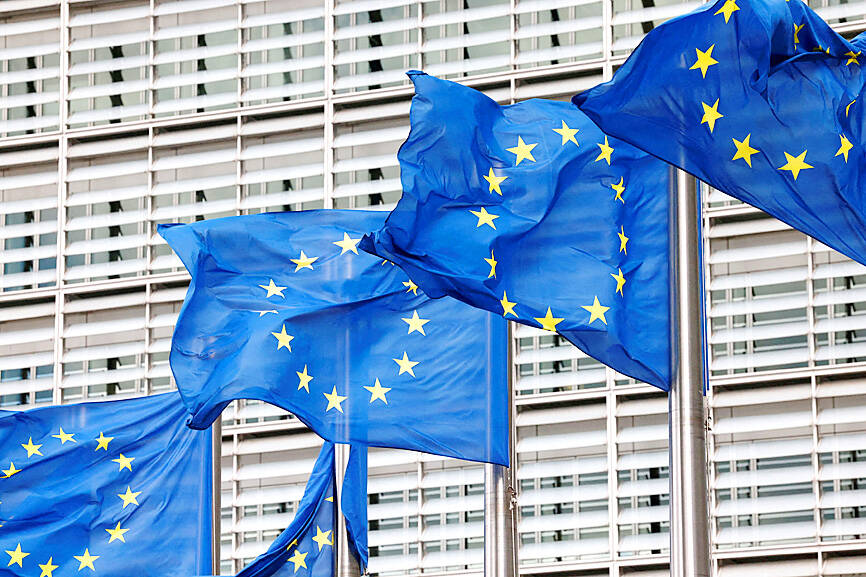Eurozone business activity made a surprise return to modest growth this month, adding to signs the downturn in the bloc may not be as deep as feared and that the currency union may escape recession, a survey showed.
S&P Global’s flash Composite Purchasing Managers’ Index (PMI), seen as a good gauge of overall economic health, climbed to 50.2 this month from 49.3 last month.
This month was the first time the index has been above the 50 mark, which separates growth from contraction, since June last year and the reading was ahead of the median Reuters poll forecast of 49.8.

Photo: Yves Herman, Reuters
“The survey undoubtedly brings welcome good news to suggest that any downturn is likely to be far less severe than previously feared and that a recession may well be avoided altogether,” S&P Global Market Intelligence chief business economist Chris Williamson said.
A mild winter so far, falling gas prices and recent positive economic data meant some quarterly growth forecasts in a Reuters poll published on Monday were upgraded although a technical recession was still predicted.
In a sign they are growing more optimistic, firms increased headcount at a faster rate this month. The employment index rose to a three-month high of 52.5 from 51.9 last month.
The PMI covering the bloc’s dominant services index also surprised to the upside, coming in at a six-month high of 50.7. It was at 49.8 last month and the Reuters poll had a forecast for 50.2.
Despite consumers facing large bills, demand only waned slightly. The new business index was just shy of the breakeven mark at 49.8, up from 48.4.
“The region is by no means out of the woods yet, however, as demand continues to fall — merely dropping at a reduced rate,” Williamson said.
Factory activity also showed an improvement but did still decline. The manufacturing PMI rose to 48.8 this month from 47.8, ahead of the 48.5 the Reuters poll forecast. An index measuring output which feeds into the composite PMI bounced to a seven-month high of 49.0 from 47.8.

TAKING STOCK: A Taiwanese cookware firm in Vietnam urged customers to assess inventory or place orders early so shipments can reach the US while tariffs are paused Taiwanese businesses in Vietnam are exploring alternatives after the White House imposed a 46 percent import duty on Vietnamese goods, following US President Donald Trump’s announcement of “reciprocal” tariffs on the US’ trading partners. Lo Shih-liang (羅世良), chairman of Brico Industry Co (裕茂工業), a Taiwanese company that manufactures cast iron cookware and stove components in Vietnam, said that more than 40 percent of his business was tied to the US market, describing the constant US policy shifts as an emotional roller coaster. “I work during the day and stay up all night watching the news. I’ve been following US news until 3am

UNCERTAINTY: Innolux activated a stringent supply chain management mechanism, as it did during the COVID-19 pandemic, to ensure optimal inventory levels for customers Flat-panel display makers AUO Corp (友達) and Innolux Corp (群創) yesterday said that about 12 to 20 percent of their display business is at risk of potential US tariffs and that they would relocate production or shipment destinations to mitigate the levies’ effects. US tariffs would have a direct impact of US$200 million on AUO’s revenue, company chairman Paul Peng (彭雙浪) told reporters on the sidelines of the Touch Taiwan trade show in Taipei yesterday. That would make up about 12 percent of the company’s overall revenue. To cope with the tariff uncertainty, AUO plans to allocate its production to manufacturing facilities in

Six years ago, LVMH’s billionaire CEO Bernard Arnault and US President Donald Trump cut the blue ribbon on a factory in rural Texas that would make designer handbags for Louis Vuitton, one of the world’s best-known luxury brands. However, since the high-profile opening, the factory has faced a host of problems limiting production, 11 former Louis Vuitton employees said. The site has consistently ranked among the worst-performing for Louis Vuitton globally, “significantly” underperforming other facilities, said three former Louis Vuitton workers and a senior industry source, who cited internal rankings shared with staff. The plant’s problems — which have not

COLLABORATION: Given Taiwan’s key position in global supply chains, the US firm is discussing strategies with local partners and clients to deal with global uncertainties Advanced Micro Devices Inc (AMD) yesterday said it is meeting with local ecosystem partners, including Taiwan Semiconductor Manufacturing Co (TSMC, 台積電), to discuss strategies, including long-term manufacturing, to navigate uncertainties such as US tariffs, as Taiwan occupies an important position in global supply chains. AMD chief executive officer Lisa Su (蘇姿丰) told reporters that Taiwan is an important part of the chip designer’s ecosystem and she is discussing with partners and customers in Taiwan to forge strong collaborations on different areas during this critical period. AMD has just become the first artificial-intelligence (AI) server chip customer of TSMC to utilize its advanced